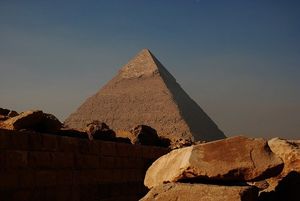Making sport of Jesus
‘Those who passed by hurled insults at him, shaking their heads’ (Matthew 27:39)
2012 has been the year for momentous events. These have drawn large crowds, with millions of global spectators reached through many media outlets. Not least among these extraordinary happenings were those surrounding Queen Elizabeth II’s diamond jubilee.
Not to be outdone, the world of sport has had its occasions too, including an international soccer event in Poland and Ukraine and the 30th Summer Olympic Games held last month in London.
Pain
At these, spectators have been entertained, not just with acts of great skill and heroism, but also, paradoxically, with endeavours associated with pain. There seems to be a peculiar interest in pain, so long as we do not have to experience it!
Trainers and coaches often encourage those under their instruction to go through the pain barrier to achieve better results. But almost nothing torments a person in pain more than the mockery of others.
Standing at or passing by the cross of Jesus were many who took especial delight in causing him mental and spiritual pain in addition to the physical pain he was enduring.
Sadly for the Lord Jesus, this kind of treatment was not new, as he had been subjected to mockery throughout his ministry. Some had dismissed him as a mere lowly artisan, ‘Is not this the carpenter’s son?’ (Matthew 13:55). Other called his moral integrity into question, ‘The Son of Man came eating and drinking, and you say, here is a glutton and a drunkard, a friend of tax collectors and sinners’ (Luke 7:34).
On another occasion, we read, ‘The Pharisees who loved money, heard all this and were sneering at Jesus’ (Luke 16:14). Others said, ‘He is raving mad. Why listen to him?’ (John 10:20). Pilate asked, ‘What shall I do, then, with Jesus who is called the Messiah?’ (Matthew 27:22).
Such tremendous hostility was shown to Jesus during his earthly ministry and throughout his many trials and testings. ‘They spit in his face and struck him with their fists. Others slapped him and said, “Prophesy to us, Christ. Who hit you?”’ (Matthew 26:67).
Suffering
Seneca the Roman Stoic philosopher and statesman wrote: ‘It’s about how you live, not how long you live’. Death in the Roman world was largely misunderstood and often viewed literally as a spectacle, because for the Romans the manner of a person’s death was the most telling indicator of his character.
In the Roman arena severely wounded gladiators were given a choice — they could be butchered like an animal or voluntarily embrace death like a free man. Violence and death became big business because they attracted vast crowds who came to watch just how someone died.
The corruption of the human heart is surely revealed in the way people can enjoy looking on the suffering of others without trying to alleviate that suffering. So it was that those who passed by the cross of Jesus made sport of him. They were probably goading one another on to torment him further.
After Pilate had released Barabbas, he had Jesus flogged before handing him over to be crucified. At that point the disgusting fun and sport really took off.
‘They stripped him and put a scarlet robe on him, and then twisted together a crown of thorns and set it on his head. They put a staff in his right hand and knelt in front of him and mocked him. “Hail, king of the Jews”, they said. They spit on him, and took the staff and struck him on the head again and again’ (Matthew 27:28-30).
Jesus had lived an exemplary life, had performed the most amazing miracles and delivered the greatest teaching ever heard, yet during his ministry anger and jealousy were expressed against him. Now during his last moments he was ‘despised and rejected by mankind, a man of suffering, and familiar with pain’ (Isaiah 53:3).
Cup
This behaviour towards Jesus was the ultimate outworking of man’s fall into sin in the Garden of Eden. ‘The wages of sin is death’ (Romans 6:23), and, as the one who carried the load of sin on behalf of his people, Jesus suffered agonisingly and died painfully.
In the Garden of Gethsemane, he said, ‘Father if you are willing, take this cup from me; yet not my will, but yours be done’ (Luke 22:42). The ‘cup’ stands for the wrath of God against sin and the sinner. That is why we read that Jesus, at the instigation of the Lord’s Supper, took the cup and not the wine.
The only reference to wine at the Supper is to ‘the fruit of the vine’ that Jesus will drink with his people in his Father’s kingdom (Matthew 26:29). Only Jesus can drink the cup of God’s wrath on behalf of others.
So when he asked his disciples, ‘Can you drink the cup I drink?’ (Mark 10:38), they should have understood that he alone was able to undertake this fearful thing.
On the cross, Jesus became the substitute shielding his people from the wrath of God whilst bearing their sin. That is why he had to go to the cross to achieve these things, because there was no other good enough to take away our sin.
But what is truly shocking is the way he died. As described in Matthew 27:39, those who passed by hurled insults at him, shaking their heads. They could not be bothered to stop, let alone sympathise with him; they just passed by, off somewhere else — so many things to do more important than Jesus!
How accurate then and now are Jeremiah’s words in Lamentations 1:12: ‘Is it nothing to you, all you who pass by? Look around and see. Is any suffering like my suffering that was inflicted on me, that the Lord brought on me in the day of his fierce anger?’
Depravity
Making sport of Jesus shows the utter depravity of the human condition, but also draws forth the great grace and love of God. Those solemn events of the first Good Friday must of course be interpreted in the stupendous event of Easter Sunday.
‘Let us fix our eyes on Jesus, the author and perfecter of our faith, who for the joy set before him endured the cross, scorning its shame, and sat down at the right hand of God’ (Hebrews 12:2).
For those who rejected the Lord Jesus, a terrible reckoning was going to take place, for Jesus had predicted the sacking and destruction of Jerusalem (Matthew 24:1-2). That appalling event took place in AD 70.
During the years AD 73-81 the Colosseum in Rome was constructed, largely funded by the fabulous treasure that Titus brought back from Jerusalem after sacking that city (some of this treasure is depicted on the Titus Arch, which is still standing in Rome).
How ironic that those who made sport of Jesus should end up paying for their most vile of sports, because they rejected him as Lord, Messiah and King!
Sadly, since the time of Jesus’ earthly life, many others have mocked Christ down the centuries, as graffiti discovered in second century Rome clearly illustrate. But all those who make sport of Jesus will one day realise their great error, for the one they made fun of is the one to whom every knee shall bow.
Before it is too late, may we all bow the knee before Christ in humble adoration as sinners saved by grace. We must not put off that response until the last day, when we will have to bow the knee before him — in abject terror (Philippians 2:10; Revelation 1:7).
Clive Anderson













